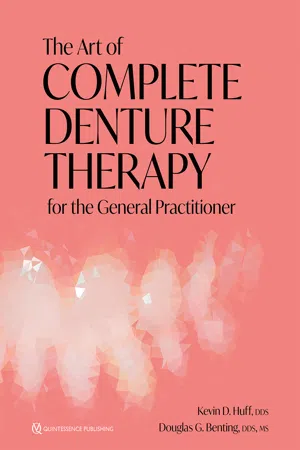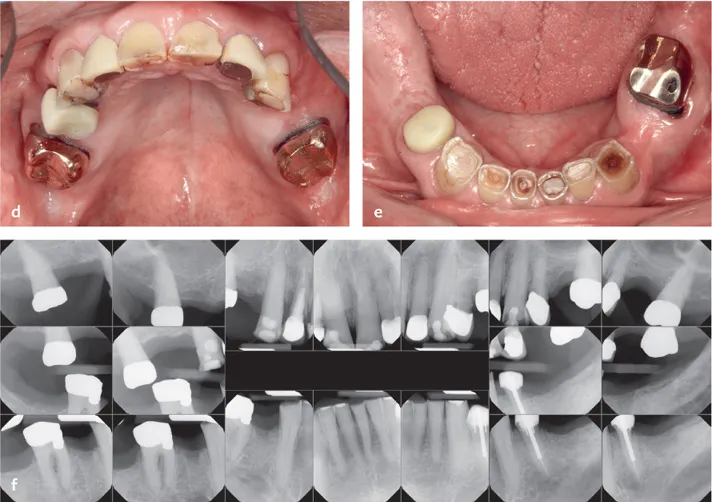
eBook - ePub
The Art of Complete Denture Therapy for the General Practitioner
- 216 pages
- English
- ePUB (mobile friendly)
- Available on iOS & Android
eBook - ePub
The Art of Complete Denture Therapy for the General Practitioner
About this book
In dentistry today, heavy focus is given to learning the techniques of fixed or implant-supported restorations at the expense of learning how to make removable dentures. As a result, many talented clinicians lack the training and experience necessary to provide functional and dependable complete denture therapy to their patients, even when this could be the best treatment option for certain patients. This book seeks to solve that problem, taking the reader step by step through the process of fabricating removable complete dentures from the very first appointment through impressions, delivery, and maintenance. Sections alternate between clinical and laboratory steps (color coded for quick reference), and technical aspects of denture making, such as master cast fabrication and baseplate and occlusal rim formation, are covered in detail for clinicians who choose to perform them in-house rather than outsourcing to a laboratory. With sections devoted to jaw and occlusion evaluation, how to determine the appropriate occlusal scheme, and more, the book seeks to empower clinicians to improve their patients' quality of life. Focus is also given to delivery and subsequent adjustment, followed by maintenance of existing dentures and determining when a new denture is needed. From start to finish, this book supplies everything you need to provide functional and esthetic dentures for your patients.
Frequently asked questions
Yes, you can cancel anytime from the Subscription tab in your account settings on the Perlego website. Your subscription will stay active until the end of your current billing period. Learn how to cancel your subscription.
No, books cannot be downloaded as external files, such as PDFs, for use outside of Perlego. However, you can download books within the Perlego app for offline reading on mobile or tablet. Learn more here.
Perlego offers two plans: Essential and Complete
- Essential is ideal for learners and professionals who enjoy exploring a wide range of subjects. Access the Essential Library with 800,000+ trusted titles and best-sellers across business, personal growth, and the humanities. Includes unlimited reading time and Standard Read Aloud voice.
- Complete: Perfect for advanced learners and researchers needing full, unrestricted access. Unlock 1.4M+ books across hundreds of subjects, including academic and specialized titles. The Complete Plan also includes advanced features like Premium Read Aloud and Research Assistant.
We are an online textbook subscription service, where you can get access to an entire online library for less than the price of a single book per month. With over 1 million books across 1000+ topics, we’ve got you covered! Learn more here.
Look out for the read-aloud symbol on your next book to see if you can listen to it. The read-aloud tool reads text aloud for you, highlighting the text as it is being read. You can pause it, speed it up and slow it down. Learn more here.
Yes! You can use the Perlego app on both iOS or Android devices to read anytime, anywhere — even offline. Perfect for commutes or when you’re on the go.
Please note we cannot support devices running on iOS 13 and Android 7 or earlier. Learn more about using the app.
Please note we cannot support devices running on iOS 13 and Android 7 or earlier. Learn more about using the app.
Yes, you can access The Art of Complete Denture Therapy for the General Practitioner by Kevin D. Huff,Douglas G.Benting in PDF and/or ePUB format, as well as other popular books in Medicine & Dentistry. We have over one million books available in our catalogue for you to explore.
Information
Chapter 1
Understanding the Art of Complete Denture Therapy
I don’t do many dentures, but when I do, success is a total crapshoot. At this point, I’m seriously considering sending all of my dentures down the road to one of the chain practices that do a lot of dentures, or I need some serious enlightenment on how to make a great denture. No matter how much adjusting, soft liners, or hard relines I make, I still can’t make my patients comfortable. I’m losing patients, and I’m losing money. Worse yet, I’m starting to hate doing dentures!
–Paraphrased from discussions with a “millennial” dentist
Is Complete Denture Therapy Still Relevant?
Complete denture therapy remains a valid option for providing a reasonable quality of life for the edentulous population. The worldwide population of those over the age of 50 years is expected to continue to grow over the next two to three decades, and despite remarkable advances in technology and oral medicine that allow for earlier diagnosis, tooth decay and periodontal disease continue to be major causes of tooth loss in the aging population. As a result, predictable treatment outcomes, less invasive treatment, and the need for quality denture care will become increasingly important. However, there is a recent trend in undergraduate dental education to reduce the time spent on complete denture therapy techniques while increasing focus on other areas of dental education to keep pace with modern technology and increased demand for focus on dental medicine. While attention to these areas of dental education is essential, a significant segment of the edentulous population may be restricted to complete denture therapy provided by clinicians who are inadequately prepared to meet their basic needs. Specifically, while dental implant therapy is a valuable service and requires adequate training to meet appropriate standards of care, implants are still out of the realm of possibility for many patients for a variety of reasons (eg, financial limitations, anatomical limitations, medical contraindications).
In the United States, the National Health and Nutrition Examination Survey (NHANES) estimates that among people from 65 to 74 years of age, 23.93% are completely edentulous. Of those who are 75 years or older, over 31% are missing all teeth.1 While it is generally accepted that the percentage of adults who are edentulous is decreasing, this is somewhat offset by the increasing number of people living past the age of 65 in the United States. Given these statistics, we believe that providing quality complete denture services should be mastered and considered essential. Unfortunately, complete denture therapy training tends to be progressively diminishing in dental school and continuing education curricula to be replaced by increased training in the field of fixed implant prosthodontics. Since understanding the biophysics and functional esthetic principles of complete denture therapy is essential to advanced therapy with dental implants, we hope that the concepts of this text are studied and implemented in general practice.
We have spoken with many general dentists over the years who feel that the level of patient satisfaction with complete dentures is just too low to justify the amount of time required to provide premium services. In addition, the value of complete denture therapy is increasingly minimized through a constant drive by third-party payers, the corporate marketplace, and by patient misconception, resulting in reimbursement rates and fee design that simply fail to make denture therapy profitable for many clinicians. We firmly believe that the success rate for denture therapy, including clinician and patient satisfaction, can be much higher than is generally experienced. The prerequisite for success is for the therapy to be done properly—which includes resisting the temptation to cut corners during construction of complete dentures—while charging ethical and reasonable fees commensurate with the time spent and expertise of the clinician providing the therapy.
In the pages that follow, our goal is to provide an interactive reference for general dentists who desire to serve the edentulous population through quality removable complete denture therapy. It is not our intention to minimize the benefits of nor to discredit implant dentistry but to simply provide a foundation for an alternative approach. Complete denture therapy, in our opinion, is also foundational to being able to provide excellent complex dental therapies, including implant-supported reconstruction.
How to Help Your Patients Decide if Complete Dentures Are Right for Them
Throughout our discussions with you, we will be applying ethical decision-making principles in an effort to assist you in making choices regarding diagnoses and technical procedures. While we fully understand that you may not agree with our ethical arguments, we hope and trust that they will stimulate your thought processes along the way toward excellent denture care.
For example, consider the following case: A 73-year-old man who has a very public persona presents to your office with the vague chief complaint of “My teeth are breaking, and I want dentures.” He states that he has no significant financial limitations. His medical history is positive for coronary bypass within the past 5 years without complications, type 2 diabetes mellitus, and two-a-day cigar smoking for over 40 years, and he is taking anticoagulant medications. His dental history, as might be obvious from his clinical presentation, reflects a lifelong history of problem-focused dental care with a poor recall compliance history. The clinical exam reflects a nonrestorable and abscessed maxillary right lateral incisor, generalized attrition and compensatory eruption, no active caries, and no periodontal pocketing beyond 3 mm. An ethical decision-making process must be exercised before the question can be answered, “What should you do?” (Fig 1-1).


FIG 1-1 (a to c) Case example 1. A patient with a severely worn dentition presents requesting full-mouth exodontia and complete denture therapy. (d to f) Case example 1. A patient with a severely worn dentition presents requesting full-mouth exodontia and complete denture therapy.
Applying an objective ethical decision-making process to this case would assist in developing an appropriate care plan2 (Table 1-1). In this process, we would carefully weigh the possible treatment options in light of five ethical principles: patient autonomy, nonmaleficence, beneficence, justice, and veracity. As clinicians, we have a duty to respect our patient’s right to decide their own course of treatment; however, this choice cannot be made without a thorough understanding of the reasonable risks and benefits of that choice. We also have a duty not to intentionally hurt our patients, including performing treatment that we know will leave them in worse condition than their initial presentation or with a higher risk of expense, discomfort, and inconvenience. Along those same lines, the principle of beneficence demands that we have a duty to promote the well-being of our patients, which may include enabling increased self-esteem as well as setting the stage for improved physical health through care that we render. The principle of justice demands that we treat our patients fairly, as we would our own friends and families, independent of their financial abilities. Of course, we also need to inform our patients fully and truthfully about all of their reasonable treatment options, which in the case of a general d...
Table of contents
- Cover
- Half Title Page
- Copyright Page
- Title Page
- Contents
- Foreword
- Preface
- How to use this book
- 1 Understanding the Art of Complete Denture Therapy
- 2 Examination
- 3 Impression Technique
- 4 Fabrication of Master Casts and Record Bases
- 5 Occlusion and Esthetics
- 6 Behind the Scenes in the Dental Laboratory
- 7 Delivery
- 8 Transitioning to Complete Edentulism
- 9 Maintaining Excellence: Reline, Rebase, Repair
- Index
- Back Cover